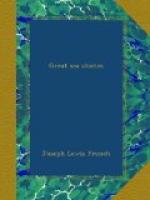“Doc,” he said, as he squeezed the water from his limp cork helmet and flattened it on the table, “have you any objections to being rescued by some craft going into Havana?”
“I have—decided objections.”
“So have I; but this wind is blowing us there—sideways. Now, such a blow as this, at this time of year, will last three days at least, and I’ve an idea that it’ll haul gradually to the south, and west towards the end of it. Where’ll we be then? Either piled up on one of the Bahama keys or interviewed by the Spaniards. Now I’ve been thinking of a scheme on deck. We can’t get back to camp for a while—that’s settled. This iron hull is worth something, and if we can take it into an American port we can claim salvage. Key West is the nearest, but Fernandina is the surest. We’ve got a stump of a foremast and a rudder and a compass. If we can get some kind of sail up forward and bring her ’fore the wind, we can steer any course within thirty degrees of the wind line.”
“But I can’t steer. And how long will this voyage take? What will we eat?”
“Yes, you can steer—good enough. And, of course, it depends on food, and water, too. We’d better catch some of this that’s going to waste.”
In what had been the steward’s storeroom they found a harness-cask with bones and dry rust in the bottom. “It’s salt meat, I suppose,” said the doctor, “reduced to its elements.” With the handles of their pistols they carefully hammered down the rusty hoops over the shrunken staves, which were well preserved by the brine they had once held, and taking the cask on deck, cleaned it thoroughly under the scuppers—or drain-holes—of the poop, and let it stand under the stream of water to swell and sweeten itself.
“If we find more casks we’ll catch some more,” said Boston; “but that will last us two weeks. Now we’ll hunt for her stores. I’ve eaten salt-horse twenty years old, but I can’t vouch for what we may find here.” They examined all the rooms adjacent to the cabin, but found nothing.
“Where’s the lazarette in this kind of a ship?” asked Boston. “The cabin runs right aft to the stern. It must be below us.” He found that the carpet was not tacked to the floor, and, raising the after end, discovered a hatch, or trap-door, which he lifted. Below, when their eyes were accustomed to the darkness, they saw boxes and barrels—all covered with the same fine dust which filled the cabin.
“Don’t go down there, yet, Boston,” said the doctor. “It may be full of carbonic acid gas. She’s been afire, you know. Wait.” He tore a strip from some bedding in one of the rooms, and, lighting one end by means of a flint and steel which he carried, lowered the smouldering rag until it rested on the pile below. It did not go out.




